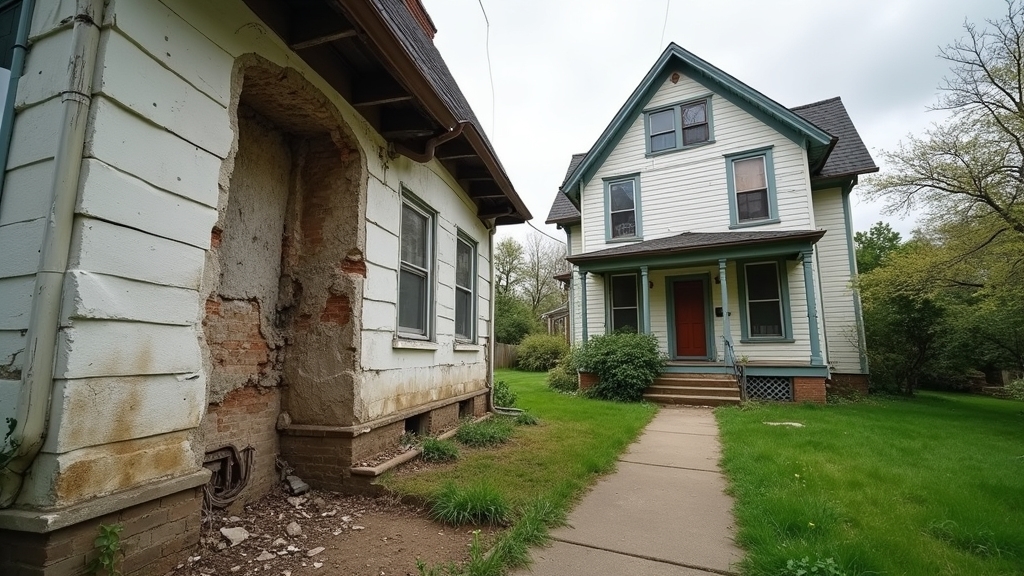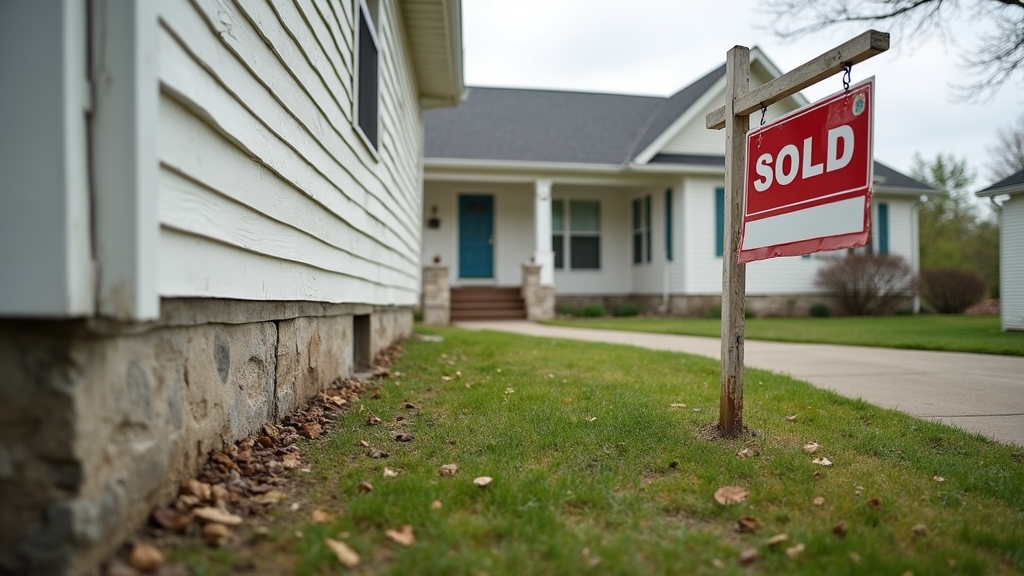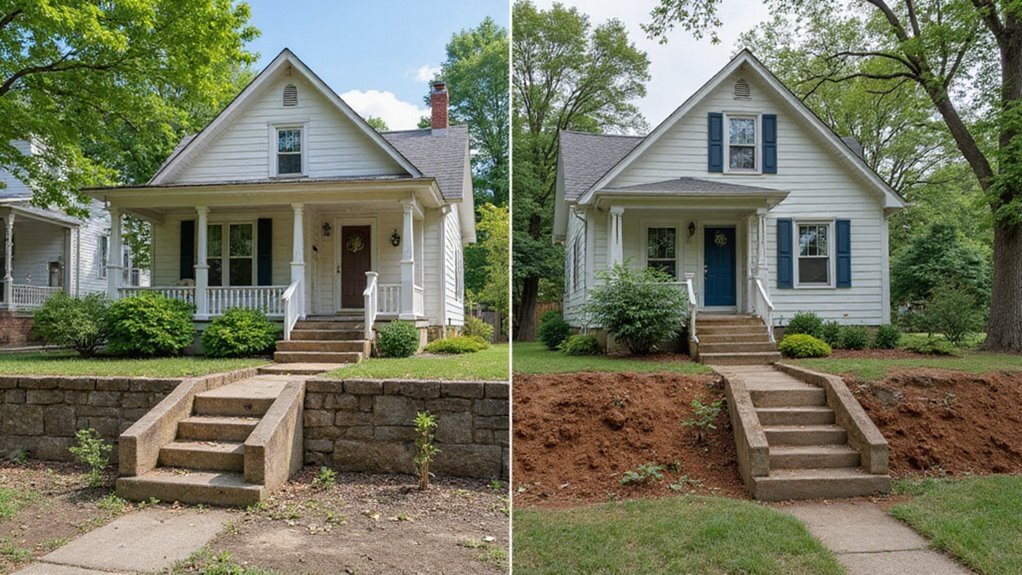Selling a house with foundation damage is much harder than selling a typical home. Most buyers worry about costly repairs and long-term problems. This fear can slow down the sale and lower your profit.
Foundation issues make buyers cautious and picky. Lenders often refuse to finance homes with serious damage. These challenges can shrink your pool of buyers and add stress to the process.
Selling a house with foundation damage is more complicated and risky than a traditional home sale, but you still have options. You can repair the damage, lower your price, or sell to a cash buyer.
Each option has pros and cons that you need to consider. This blog will guide you through each step so you can choose the best path for your situation.
Key Takeaways
- Homes with foundation damage attract fewer buyers, often limiting the pool to investors and cash buyers rather than traditional buyers.
- Foundation issues typically require price reductions of 10–20% compared to similar, undamaged homes.
- Traditional buyers may face loan denials, as lenders frequently refuse mortgages for homes with unresolved structural damage.
- Sellers must legally disclose all known foundation problems, unlike traditional sales where such disclosures may be less extensive.
- Selling with foundation damage generally results in longer sale times, more negotiations, and increased appraisal challenges compared to traditional home sales.
Understanding Foundation Damage and Its Implications

Foundation damage can weaken a house and lower its value. Even small cracks or sinking can mean bigger problems. If left unchecked, these issues may get worse over time. Home inspections involve thorough examination of property condition by qualified professionals to identify such issues early on. Many buyers avoid homes with unfixed foundation problems. A professional inspection helps find all visible and hidden damage. Inspectors also check for moisture and shifting under the house.
You need a detailed inspection report to get repair quotes from licensed contractors. If you plan to sell, these documents help set a fair price. Lenders and buyers use them to judge risk. If you skip the inspection or don’t get repair quotes, your house may take longer to sell. You might also have to accept a lower offer. Full disclosure protects both you and future buyers. Utilizing a swift transaction approach such as cash buying can also help you close quickly, minimizing the impact of foundation issues during the sale process.
Key Differences in the Selling Process
When you sell a house with foundation damage, you’ll face stricter disclosure requirements and a dramatically reduced buyer pool. Market data shows that serious structural issues can limit offers to cash buyers and investors, not traditional buyers using financing. As a result, your negotiation influence shifts, often requiring price adjustments or repair credits to secure a deal.
Additionally, potential buyers may be concerned about title problems like liens or unresolved disputes, which can further complicate the sale process. The presence of foundation issues can also impact a home’s land value and overall appeal, making it even more challenging to attract offers from conventional buyers.
Disclosure Requirements Increase Significantly
Foundation damage leads to much stricter disclosure rules for home sellers. Sellers must legally share all known foundation issues and past repairs. Not following these rules can cause legal trouble or cancel the sale.
Most states require sellers to list the damage, repair dates, and any warranties. Buyers and their agents closely check these disclosure forms. If you hide structural issues, you risk legal action after the sale.
Data shows undisclosed foundation problems often cause lawsuits once the home sells. Clear and full disclosure protects sellers from legal risks. It also helps buyers understand the home’s true condition and needed repairs.
Buyer Pool Shrinks Dramatically
Foundation problems make it much harder to sell your home. Fewer buyers are interested when a house has structural issues. Most people want move-in ready homes and may avoid yours after seeing an inspection report.
Lenders often refuse loans for homes with unresolved foundation damage. FHA and VA loans usually do not approve properties with these defects. If you need a loan, your options will be limited.
Investors or cash buyers become your main audience if foundation repairs are needed. These buyers often expect a lower price. Homes with foundation issues may sit on the market for a longer time.
Negotiation Leverage Shifts Quickly
Negotiation leverage can change quickly when foundation problems are discovered. If a home has foundation issues, buyers gain most of the negotiating power. Sellers usually lose their ability to set terms or ask for higher prices.
A foundation inspection often leads buyers to make lower offers. Buyers may also demand that sellers pay for repairs or offer repair credits. Sellers should expect less flexibility and more pressure during negotiations.
If the home had no foundation issues, sellers would have more control. They could set the asking price and only make small concessions. With foundation damage, buyers usually set the terms and expect major price reductions.
Foundation problems also affect the sale timeline. Buyers might delay closing or ask for more inspections. Sellers should prepare for a longer and less predictable process.
Disclosure Requirements for Foundation Issues
If you sell a house with foundation problems, you must tell buyers about it. Laws require you to share any known issues. Not telling can lead to legal trouble or canceled sales. You should give buyers any foundation reports you have. If you got repair estimates, share those too. Some forms will ask about cracks, uneven floors, or doors that stick. If you have fixed the foundation before, include repair details and warranties.
Always answer all questions about the home’s structure. Clear disclosure helps avoid disputes and protects both sides. Additionally, understanding disclosure requirements ensures you comply with state laws and avoid potential legal repercussions. Being transparent about foundation issues can also impact the value of your home, so it’s important to provide all relevant information upfront.
Impact on Home Value and Pricing Strategies

You’ll need to set an adjusted market listing price that accurately reflects the foundation damage, as buyers often expect significant concessions. Data shows that properties with structural issues can sell for 10%–20% below comparable homes, giving buyers substantial negotiation advantage. Factor in estimated repair cost deductions to position your property competitively and streamline the sale process.
Additionally, presenting a faster transaction process can make your property more appealing to buyers seeking quick closings despite structural concerns. It’s also important to be aware of potential liens that could complicate the sale if not properly addressed beforehand.
Adjusted Market Listing Price
Foundation damage lowers your home’s market value. You must lower your listing price to reflect this condition. Buyers will expect a discount compared to homes without damage.
If you know the repair costs, subtract that amount from your asking price. Recent sales of similar damaged homes give you a useful price range. Local market demand may affect how much you need to reduce the price.
If you are unsure, ask a real estate agent who has experience with damaged homes. They can help you set a fair price. This will help attract interested buyers and avoid overpricing.
Buyer Negotiation Leverage
Homes with foundation damage give buyers more power in negotiations. Buyers know about the risks and extra repair costs. They often use these facts to justify lower offers.
Most initial offers are 20–30% below similar homes without damage. Buyers may point to recent sales and expected repair bills. Homes with foundation issues also take longer to sell.
Sellers have less control over price and terms in these cases. If you want to compete, you must adjust your asking price. If you are open about the damage, buyers may ask more questions but trust you more.
If you do not disclose the problem, deals may fall through later. Honest disclosure can help avoid legal trouble. Consider these factors before listing your home.
Repair Cost Deductions
When foundation damage is present, buyers usually lower their offers by the expected repair costs. Many buyers use contractor estimates or engineer reports to justify these deductions. This often reduces the home’s market value.
Typical repair costs range from $4,000 to $20,000, depending on the damage and location. Appraisers will lower the home’s value based on these repair needs. If buyers think repairs might cost more, they may subtract extra money from their offers.
Lenders may not approve loans for homes with foundation problems. Sellers should be open about any known issues. If you want to stay competitive, set your price with these repair deductions in mind.
Attracting Buyers Despite Structural Problems

You can attract buyers even if your home has foundation problems. Share inspection reports and repair estimates to build trust. If you show proof of repairs or warranties, buyers will feel more secure. Additionally, providing a fair market value assessment can help set realistic expectations for buyers and facilitate a smoother negotiation process. Understanding the market conditions can further influence how you position your property to appeal to potential buyers.
Investors and buyers looking for fixer-uppers may be interested in your property. If you set a fair price that reflects repair costs, you will attract more serious buyers. Clear communication about the problem and possible solutions can help you reach more people. If you are open and honest about the home’s condition, buyers are more likely to consider it. If you explain what needs fixing, it shows you are not hiding anything. This approach can lead to a faster sale even with structural issues.
Inspection and Appraisal Challenges
You’ll face significant appraisal value reductions when foundation damage is identified, as lenders and appraisers typically factor repair costs into their valuations. Inspection reports often trigger negotiation hurdles, with buyers demanding price concessions or repair credits based on structural findings.
Understanding these industry standards is critical to setting realistic expectations and steering transaction hurdles efficiently. Additionally, working with a reputable cash buyer can help navigate these appraisal challenges more smoothly. Since foundation damage can be costly and complex to repair, repair costs are often a major consideration for both buyers and sellers in the valuation process.
Appraisal Value Reductions
Homes with foundation damage almost always lose value in appraisals. Appraisers must note structural issues, which lowers the home’s appraised value. Lenders want accurate information, so appraisers adjust values to show repair costs and extra risk.
Repair costs are estimated and taken from the property’s value. Lenders may not approve loans for homes with foundation problems. If buyers see foundation issues, demand drops, and prices fall.
Structural risk makes appraisers more cautious. If you understand these factors, you can better predict your home’s appraisal outcome.
Inspection Negotiation Hurdles
Selling a home with foundation damage is more complicated during inspections. Buyers often ask for proof of repairs or insurance claims. If you cannot provide documents, many buyers may walk away.
Inspectors may find more problems, leading buyers to ask for lower prices or major repairs. Sellers should prepare by gathering structural reports, repair estimates, and any permit records. These steps can help avoid delays and failed sales.
Compared to normal sales, homes with foundation issues face tougher inspections and more repair demands. Insurance claims and construction permits are reviewed carefully. Closing often takes longer if there is foundation damage.
Repair Options: To Fix or Not to Fix
When deciding whether to fix your foundation before selling, consider cost, time, and your local market. Repairs can cost between $2,000 and $15,000 or more. If your market favors move-in ready homes, repairs may help you sell faster. Additionally, addressing foundation issues can improve the home’s presentation, making it more appealing to buyers. The severity of the damage matters a lot.
Small cracks may only need cosmetic fixes, but large issues need a professional. If repairs are costly, check if you will get that money back in a higher sale price. Foundation repairs can delay your sale, especially if they require extensive work. Some buyers want a home with no problems, while others may accept a lower price if you sell as-is. Understanding the merits of selling house before divorce can influence your decision to invest in repairs before listing.
Negotiating With Buyers Over Repairs
Foundation issues can make it harder to sell your home. Most buyers will want a professional inspection and may ask for repairs. Sellers should expect to discuss options like repair credits, price cuts, or fixing the problem before closing.
Sellers can use recent sales and repair quotes to explain their price. If you improve curb appeal and staging, buyers may worry less about the foundation. Sellers must share all known issues honestly to keep trust.
Offering repair credits attracts investors, as they handle repairs after buying. Completing repairs before selling helps attract regular buyers and can raise your home’s price. If you lower the price, the sale may go faster with fewer talks.
Better home staging makes the home look more appealing and can increase buyer interest. Conducting a thorough market analysis and setting accurate pricing can also help mitigate concerns about foundation damage. Every strategy has benefits depending on your goals and the buyer’s needs. Choose the option that works best for your situation.
Financing Obstacles for Potential Buyers
Most buyers will have trouble getting a loan for a house with foundation problems. Lenders see these homes as risky and may refuse financing. This means selling your home could take longer and attract fewer buyers.
Lenders often ask for larger down payments if the foundation is damaged. They might also require special inspections before approving a loan. Sometimes, lenders will only approve the mortgage if all repairs are finished first.
Many buyers will only qualify for certain types of loans, such as cash or renovation loans. Even buyers with good credit may face loan denials. These obstacles can lower your final sale price.
Working With Real Estate Agents Experienced in Structural Problems
You need a real estate agent with proven experience in handling properties with structural issues, as their expertise directly impacts your selling strategy and final sale price. They’ll ensure you meet all mandatory disclosure requirements and help you structure repair allowances to attract serious buyers. With the right agent, you can reduce legal risk and maximize your negotiation advantage in a challenging market.
Identifying Qualified Agent Expertise
A qualified agent for selling a house with foundation damage must have experience with similar properties. This agent knows how to handle homes with structural problems. They understand how to present your house in the best way possible.
You should look for agents with a history of selling homes that have foundation issues. Some agents may also have special training or certifications in dealing with damaged properties. If an agent cannot show proof of past success, consider looking for someone else.
A good agent uses smart staging to show off your home’s best features. They will help you highlight strengths and reduce focus on any flaws. If you want accurate repair estimates, your agent should know reliable contractors and inspectors.
Agents must also know the local market for homes with damage. They can find buyers who are open to repairs and negotiate fair prices. If your agent has these skills, you will have a better chance at a successful sale.
Navigating Disclosure Requirements
Sellers must follow the law when disclosing property defects. You need to share any known foundation issues with buyers. Full and accurate disclosure is required.
A real estate agent with experience in structural problems can help you understand local disclosure rules. The agent will guide you through collecting important documents, like repair receipts and inspection reports. If you provide this information early, you can build trust with buyers.
Buyers expect to know about material defects before buying. The National Association of Realtors reports that 89% of buyers want full disclosure. If you work with a knowledgeable agent, you can avoid legal issues after the sale.
Negotiating Repair Allowances
Negotiating repair allowances is important when a home has foundation damage. Buyers often worry about these issues, so sellers must be prepared. An experienced real estate agent can help you handle these negotiations.
Agents with knowledge of structural problems use market data, contractor quotes, and inspection reports. They help you decide on a fair repair allowance. If you want better results, choose an agent who understands foundation repairs.
A good agent can compare similar home sales with foundation issues. They present repair estimates to support the requested allowance. If you need to improve buyer interest, home staging and curb appeal are also helpful.
Strategic negotiation helps both buyers and sellers reach a fair agreement. If you follow expert advice, you can protect your interests during the sale.
Marketing Strategies for Homes With Foundation Damage
Homes with foundation damage can still be sold if marketed the right way. Sellers should first get a professional foundation inspection report. This report gives buyers clear facts about the home’s condition.
If you share this report in your listing, buyers will trust you more. Sellers should also mention any repair financing options. Many buyers will consider homes that need repairs if they can get help with funding.
Targeting investor groups and cash buyers is a good idea. These buyers often look for homes sold as-is. If you present the property as an investment opportunity, you may attract more interest.
Listing descriptions should focus on the potential value of the home. Sellers should avoid only highlighting the problems. This approach helps reach more qualified buyers even with foundation issues.
Legal Considerations and Potential Liabilities
When selling a house with foundation damage, you must follow all disclosure laws. Buyers have the right to know about any major problems. If you do not disclose issues, you risk lawsuits, canceled sales, or fines.
Sellers must fill out disclosure forms honestly. Keep records of inspections and repairs as proof. A real estate lawyer can help you understand current rules.
You must disclose defects even if you sell the property “as-is.” These steps lower your risk of legal problems. Following the law also helps the sale go smoothly.
The Role of Cash Buyers and Investors
Cash buyers and investors are important when selling a house with foundation damage. These buyers can close deals fast and often pay in cash. They are usually interested in homes that need repairs.
Investors know how to handle major repairs and understand the risks involved. If a home needs big fixes, they may still want to buy it. They have the money and experience to renovate the property.
Traditional buyers often need a mortgage and may back out if there are problems. Investors do not rely on mortgage approvals. If you work with investors, you can avoid many delays and extra steps.
Investors decide their offer by subtracting repair costs from the home’s value. If the numbers work, they will make an offer. This can make the sale process much simpler and faster for you.
Timeline Expectations for Each Sales Approach
Understanding the timeline for each sales approach helps you set realistic expectations. Traditional home sales often take much longer than selling to investors. The process depends on repairs, buyer requirements, and lender rules.
Traditional sales can take 60 to 90 days or more. Buyers and lenders may insist on fixing foundation problems before closing. Repair contractors might have busy schedules, which can add weeks to your timeline.
Traditional home sales often stretch beyond 60 days, especially when foundation repairs and contractor schedules cause unexpected delays.
Selling to cash buyers or investors is usually much faster. These buyers often accept foundation issues and skip repair contingencies. If speed is important, cash sales can close in 7 to 14 days.
Lender-required repairs can slow down traditional sales. This adds more steps and extra waiting time. Consider your goals and timeline when choosing your selling method.
Conclusion
Selling a house with foundation damage is more complicated than a traditional home sale. If you understand the process, you can avoid common mistakes. Proper planning helps you handle disclosures, price your home, and attract serious buyers.
If you need to sell quickly, cash buyers are often your best choice. We buy houses for cash, even those with foundation problems. This option allows you to skip repairs and close on your timeline.
If you want a fast, stress-free sale, Limitless Homes of KC can help. We offer fair cash offers for homes in any condition. Contact us today to get started with a no-obligation offer.

